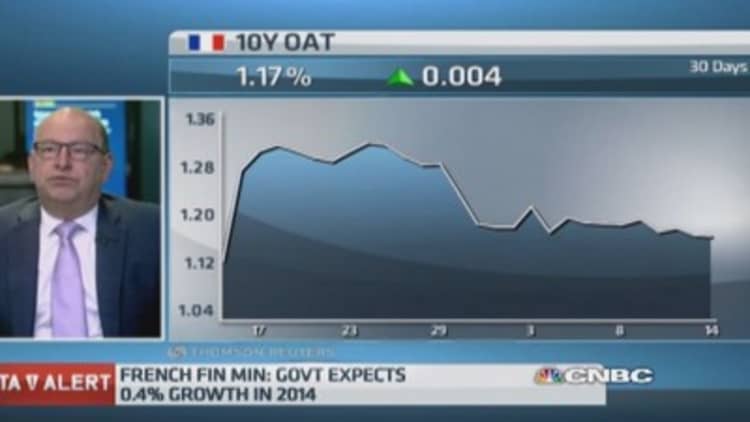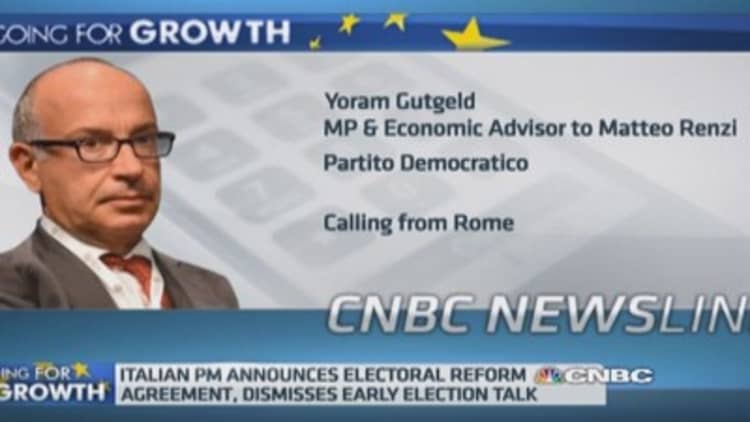
Investors breathed a sigh of relief on Friday, as the euro zone's economy grew more than expected in the third quarter and Germany narrowly avoided falling into recession.
Euro zone gross domestic product (GDP) grew by 0.2 percent on the previous quarter, according to data from the Eurostat, the European Union's statistics service, beating a Reuters forecast of a 0.1 percent expansion.
The 18-country bloc that uses the euro emerged from an almost two-year recession in the second quarter of 2013, but it's been an uneven journey for the region since then, with diminishing demand plaguing the region alongside geopolitical concerns with tensions in the eastern part of Ukraine.
Read MoreECB survey downgrades inflation, growth forecasts
However, Nancy Curtin, chief investment officer of Close Brothers Asset Management, said the figures "nothing to write home about" and warned of a "heavily clouded" outlook for the region.
But she added: "In the context of the negative news emerging from the euro zone in recent months, the simple fact that growth isn't slowing will reassure investors."
France beats
Good news from both France and Greece bolstered the euro zone's growth in the third quarter.
French GDP expanded by 0.3 percent quarter on quarter, beating forecasts of 0.2 percent. It comes after the country's economy stagnated in the first quarter of the year and contracted in the second, leading it to be dubbed the "sick man of Europe".
Steven Bell, director of global macro at F&C, said the figure was a relief, but that structural problems in France - such as high taxes and a rigid labor market - remained.
Read MoreRecession obsession: Traders brace for euro zone GDP
"All of these numbers begin with a zero," he told CNBC on Friday. "It's a relief, but they're inching-ahead numbers from the French economy."
Meanwhile, revised figures showed that Greece emerged from nearly six years of recession in the first quarter. In the third quarter, the economy expanded by 0.7 percent on the previous three months.
Germany avoids recession
There was also some positive news from Germany, where the economy expanded by 0.1 percent over the period, meeting expectations. The euro zone's largest economy contracted in the second quarter, giving rise to concerns that it could be heading into a recession.
However, Italy remained in recession in the third quarter with its economy shrinking by 0.1 percent, after unexpectedly slipping back into recession in the second quarter.

When it comes to struggling Italy, Partito Democratico, MP and economic adviser to Prime Minister Matteo Renzi, said labor market reforms and "massive" tax reductions would help the bolster the economy.
Read More
"If Italy keeps doing the structural reforms, reducing costs, reducing taxes, reforming the labor market, reforming the institutional mechanisms so that we can get the political decision making faster and more effective, Italy will recover and will reclaim the place it should have in Europe and the world economy," he told CNBC on Friday.
"Politically Italy is in a very different place as it had been for many years. There is a real desire for change within the country."
ECB QE?
Updated inflation figures for the euro zone were also published Friday, and economists and investors are likely to study both data points for an indication of how European monetary policy could play out.
Prices in the region grew by 0.4 percent year-on-year in October, meeting expectations, although the core rate (excluding food and energy) came in below forecasts at 0.7 percent.
Growth-sapping low inflation has been plaguing the euro zone economy for months. The European Central Bank (ECB) has already launched a host of stimulus measures to reverse disinflation, including cutting interest rates to record lows and announcing plans to purchase covered bonds and asset-backed securities (ABS) - and a number of experts are now calling for the bank to do more.
Howard Archer, chief European economist at IHS Global Insight, said the GDP and inflation figures were unlikely to dilute expectations of further action -- this time a program of bond-buying.
"Full-blown quantitative easing in the shape of buying government bonds (remains) a very real possibility," he said in a note.
"In the near-term though, the ECB is likely to stay in "wait and see" mood to see how effective its measures already announced in increasing its balance sheet."
- By CNBC's Katrina Bishop


